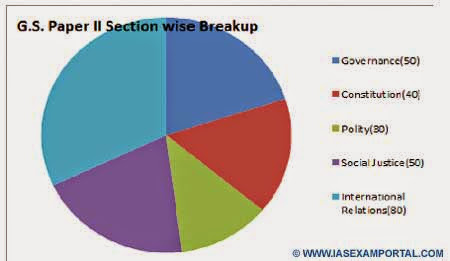(HOT) UPSC Current Affairs 2025 PDF
NEW! The Gist (NOV-2025) | E-BOOKS
(Getting Started for IAS Mains) Importance of General studies in Mains and Overview of General Studies Paper-1,2,3,4

(Getting Started for IAS Mains) Importance of General studies in Mains and Overview of General Studies Paper-1,2,3,4
UPSC has brought many changes in the exam pattern in 2013. These changes include increasing the no. of general studies paper and reducing the number of optionals to one. Other changes include increase in percentage marks for Essay and Personality test. Detailed marks and weightage of each paper is given below in Table and Pie Chart.
| Paper | Name | Description | Marks |
| Paper-I | Essay | 250 | |
| Paper-II | General Studies-I | Indian Heritage and Culture, History of India and world, Geography of India and world and Society | 250 |
| Paper- III | General Studies-II | Governance, Constitution, Polity, Social Justice and International relations etc. | 250 |
| Paper- IV | General Studies-III | Science and Technology, Economic Development, Bio-diversity, Security and Disaster Management | 250 |
| Paper V | General Studies-IV | Ethics, Integrity, Attitude, Aptitude and case studies | 250 |
|
G.S. Total |
1000 | ||
| Paper-VI | Optional Subject | Paper-I | 250 |
| Paper-VII | Optional Subject | Paper-I | 250 |
| Sub Total mains | 1750 | ||
| Personality Test | 275 | ||
|
Grand Total |
2075 | ||

Printed Study Material for IAS Exam (UPSC) (Combo)
(Download) UPSC, IAS MAINS Exam Previous Year Question Papers
(Syllabus) IAS MAINS Examination (GS + Optional)
As you can see from above diagrams that there are four papers for General Studies now. Each of them carry 250 marks and in total they make 1000 marks. Thus it is obvious that weightage of General Studies has increased a lot in Civil Service Exam. General studies now constitute close to 57% of weightage in the mains examination, earlier it used to be 30% of the mains paper, it becomes necessary to have a sound strategy for General Studies paper. UPSC mentions that nature and standard of questions in Civil Service Examination General Studies papers (Paper II to Paper V) will be such that a well-educated person will be able to answer them without any specialized study. So topics related to national importance and social relevance become extremely important. Similarly important international events related to economy, polity or international relations are also extremely important.
We are also providing the topic wise breakup of each G.S. Paper of mains 2013. So that you can understand the topics which are asked more and you can build your strategy accordingly. In general students should go through current . Syllabus of general studies has been widened in 2013 and also the number of questions in paper has been increased to twenty five, which makes it necessary to have a macro understanding of all the topics mentioned in the syllabus. Topic wise breakup of all General studies papers 2013 is given below, so that you can have an idea about weightage of various topics in the syllabus broadly.
G.S. Paper I, Civil Services Main 2013 Exam which includes World History, geography, Indian History and Culture. It consisted of 25 questions of 10 marks each. Few of the questions consisted of subsections too, thus making the paper more dynamic. Maximum questions (7) were asked from geography followed by questions from Indian history after independence(5). Topic wise breakup is provided below.

Similarly , G.S.Paper II which tests Governance, Constitution, Polity, Social Justice and International relations etc. Maximum number of questions were asked from International relations section (8) followed by governance and social justice (5 each). Section wise breakup is given below.

G.S.Paper III which tests topics like Technology, Economic Development, Bio-diversity, Environment, Security and Disaster Management etc. Maximum number of questions were asked from Economic development section followed by Security related questions. Section wise breakup is given below.

G.S.Paper IV which tests topics like Ethics, Integrity and Aptitude and case studies related to them, it was introduced for the first time in UPSC. The question paper was divided into two sections. One section included the definitions of topics mentioned in the syllabus and other included the case studies based questions. Both of them contained almost equal marks in the paper.
EXPRESS POINTS:
-
Consistency in studies is basic requirement for success in UPSC. Remember small steps daily makes a huge difference.
-
Try to design a proper strategy for exam, based on your strength and weaknesses. Strategy should include covering full syllabus and multiple revision as well.
-
Try to develop a timeline for entire syllabus, meaning you should design how much time you would take for particular topic. That will help you in judging yourself, that how far behind you are in your plan.
-
As mentioned in UPSC notification “The questions are likely to test the candidate’s basic understanding of all relevant issues, and ability to analyze, and take a view on conflicting socio- economic goals, objectives and demands. The candidates must give relevant, meaningful and succinct answers.” So question will test basic understanding only and not deep knowledge. But in order to test all relevant issue they might ask questions which are multi-dimensional.
-
Try to finish every topic from one good source multiple times, rather than reading multiple sources and not finding the time for revision.

